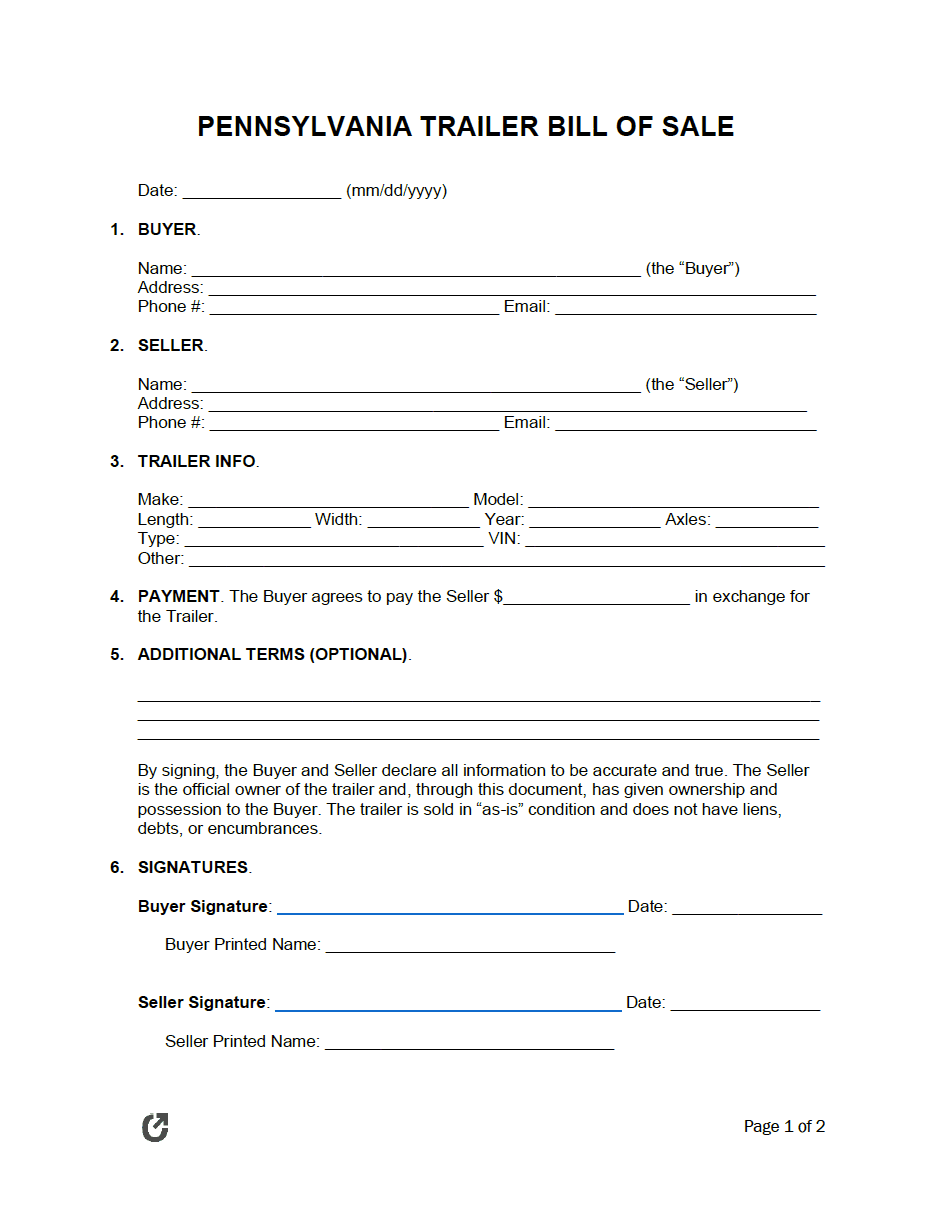Pennsylvania Trailer Bill of Sale Form
A Pennsylvania trailer bill of sale form standardizes the ownership transfer of a pull-behind between a buyer and a seller within the state. This legally binding document features essential details, such as the full names and addresses of both parties involved, the sale price, and a comprehensive trailer description, which includes its make, model, year, and vehicle identification number (VIN). Furthermore, the form should record the date of the sale. It must also be duly signed by both the buyer and the seller, verifying the accuracy and agreement of the transaction details. The acquisition of this form, coupled with the transfer of the title, is a crucial step in ensuring a legitimate and lawful transfer of trailer ownership.
|
What is a Pennsylvania Trailer Bill of Sale?
A Pennsylvania trailer bill of sale operates as a legal safeguard, delineating the rights and responsibilities of both parties to prevent potential future disputes or misunderstandings surrounding the deal. In addition to giving protection, the form contains specifics regarding the trailer’s condition, including any warranties or “as is” clauses that indicate the buyer accepts the trailer in its current state. Notarization of the document, though not mandatory, can further authenticate the transaction and provide an additional layer of security against potential disputes or fraud. Moreover, it serves as a concrete sale record, which could be essential for tax reporting and accounting purposes, facilitating a smooth and transparent transaction for the buyer and seller.
How to Register a Trailer (2 Steps)
Registering a trailer in Pennsylvania is a straightforward process that mandates titling and registration for trailers for use on public roads. When an individual purchases a trailer, they must title and register it within twenty (20) days of the sale. The process involves submitting a completed application and the necessary fee to the Pennsylvania Department of Transportation (PennDOT). Taking these steps ensures that all the legal formalities are taken care of, establishing the lawful use of the trailer within the state.
Step 1 – Title & Registration
Successfully registering and titling a trailer in Pennsylvania requires a completed bill of sale and a properly assigned title from the seller. Both documents must provide the buyer and seller’s information and the trailer’s details.
The owner must bring the finalized paperwork, payment, and valid identification to a PennDOT-authorized agent. During the appointment, they must complete the Application for Certificate of Title (Form MV-1) by including accurate personal information and the trailer’s description (i.e., its make, model, year, and VIN).
After obtaining the application packet, PennDOT provides an approval or denial notice. If approved, the applicant receives a new title and registration, thus finalizing the process. The recipient should keep copies of all submitted documents for personal records and to facilitate a smooth and transparent ownership transition.
Step 2 – Renewal
In Pennsylvania, maintaining the legality of operating a trailer on public roads involves renewing the trailer registration periodically, generally every one (1) or two (2) years, depending on the option chosen by the owner.
Before the current registration expires, PennDOT sends a renewal notice to the owner. Upon receiving this, the owner should verify the information on the letter for accuracy and make necessary updates.
The next step involves sending the state office the required paperwork and paying the renewal fee. This process can occur online through the official state website or by mailing a check or money order accompanied by the renewal notice.
Once the renewal fee and necessary documents are successfully processed, PennDOT issues a new registration card and sticker, indicating the completion of the renewal process. Residents should initiate this process before expiration to avoid fines or penalties associated with an expired registration.
